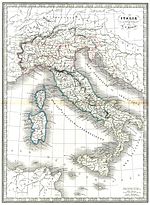
Back الجمهورية الليغورية Arabic República Ligur AST Liquriya Respublikası Azerbaijani Лігурыйская рэспубліка Byelorussian Republik Ligur Breton República Lígur Catalan Лигурийн республика CE Ligurská republika Czech Ligurische Republik German República Ligur Spanish
This article has multiple issues. Please help improve it or discuss these issues on the talk page. (Learn how and when to remove these template messages)
|
Ligurian Republic | |||||||||
|---|---|---|---|---|---|---|---|---|---|
| 1797–1805 | |||||||||
| Motto: Libertà, Eguaglianza (Italian) ("Liberty, equality") | |||||||||
 Continental Italy in 1799 | |||||||||
| Status | Sister republic of France | ||||||||
| Capital | Genoa | ||||||||
| Common languages | Italian, Ligurian | ||||||||
| Government | Directorial republic (first Constitution) Presidential Republic (since 1802) | ||||||||
| Doge | |||||||||
• 1802–1805 | Girolamo Luigi Durazzo | ||||||||
| Legislature | Legislative Council[1] Since 1800: National Council Senate | ||||||||
| Council of Seniors | |||||||||
| Council of Sixty | |||||||||
| Historical era | Napoleonic Wars | ||||||||
| 14 June 1797 | |||||||||
| 4 June 1805 | |||||||||
| Currency | Genoan pound | ||||||||
| |||||||||
| Today part of | Italy ∟ Liguria | ||||||||
| History of Italy |
|---|
 |
|
|
The Ligurian Republic (Italian: Repubblica Ligure, Ligurian: Repubbrica Ligure, French: République ligure) or Republic of Liguria was a French client republic formed by Napoleon on 14 June 1797. It consisted of the old Republic of Genoa, which covered most of the Ligurian region of Northwest Italy, and the small Imperial fiefs owned by the House of Savoy inside its territory. Its first Constitution was promulgated on 22 December 1797, establishing a directorial republic. The directory was deposed on 7 December 1799 and the executive was temporarily replaced by a commission.[2] In 1802, a doge was nominated for a 5-year term, according to the second Constitution imposed by Napoleon, and a Senate was established.
The Republic was briefly occupied by Austrian forces in 1800, but Napoleon soon returned with an army and retook it. A new Constitution was published in 1802, establishing institutions more similar to those of the previous Genoese Republic, with a Doge who was president of a Senate. The Ligurian Republic used the traditional Genoese flag, consisting of a red cross on a white background.
In June 1805, the territory was annexed by the First French Empire.
- ^ Woolf, Stuart (November 2002). Napoleon's Integration of Europe. ISBN 9781134944200.
- ^ Journal de Bruxelles 90, page 718 and 719, 'De Gênes, le 16 Frimaire (7 décembre 1799)'
© MMXXIII Rich X Search. We shall prevail. All rights reserved. Rich X Search

